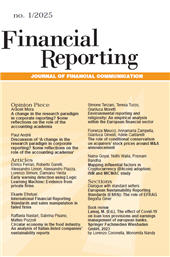Circular economy in the food industry : an analysis of Italian-listed companies' sustainability reports
81-115 p.
Purpose: The paper investigates the circular economy (CE) disclosure released by companies in response to the issuing of CE-related policies since the CE Action Plan 2015, using the institutional view of legitimacy theory. Design/methodology/approach: The study adopts a multiple case study methodology by content-analyzing the CE disclosure released by all listed Italian agri-food companies in their sustainability reports in the period 2016-2021. Findings: The findings show that Italian agri-food companies released low levels of CE disclosure. This result suggests a lack of strategic relevance attributed to the CE issue or the absence of CE-related standards to rely upon. The results could also reveal companies' scarce implementation of CE business models. The findings also show an increase in both the quantity and quality of CE disclosure released in response to the issuing of a public CE-related policy or framework, supporting the theoretical arguments of the institutional view of legitimacy theory
Originality/value: In light of the worldwide increasing attention toward environmental issues and the CE paradigm, particularly in the food industry, this study is the first to investigate the CE disclosure released by agri-food companies in response to the issuing of CE-related policies and voluntary frameworks. Practical implications: The findings show that institutional pressure through the issuing of new CE-related policies and voluntary frameworks promotes increased CE disclosure by companies, suggesting that implementing both Directive 2022/2464/EU and the EFRAG standards would further encourage the release of CE disclosure. [Testo dell'editore]
-
Articoli dello stesso fascicolo (disponibili singolarmente)
-
Informazioni
Codice DOI: 10.3280/fr202516707
ISSN: 2036-6779
PAROLE CHIAVE
- SDG, environmental disclosure, CE Action Plan, Directive 2014/95/EU, agri-food companies, legitimacy theory


